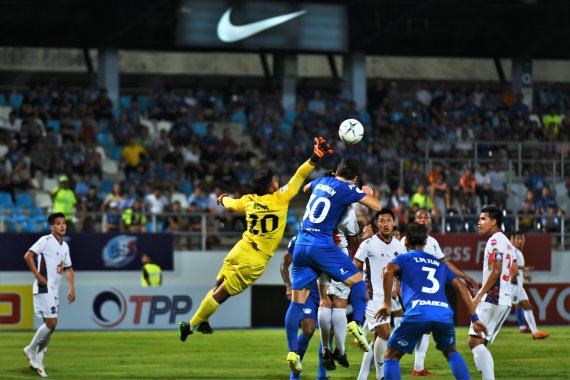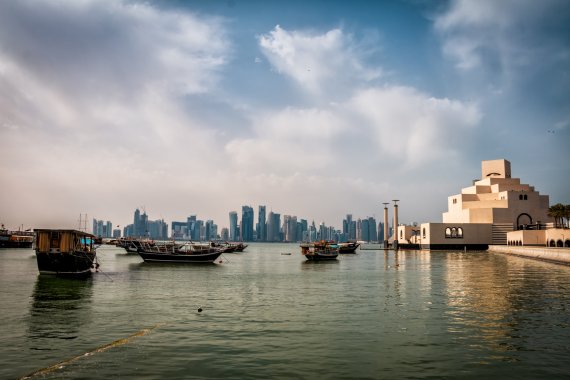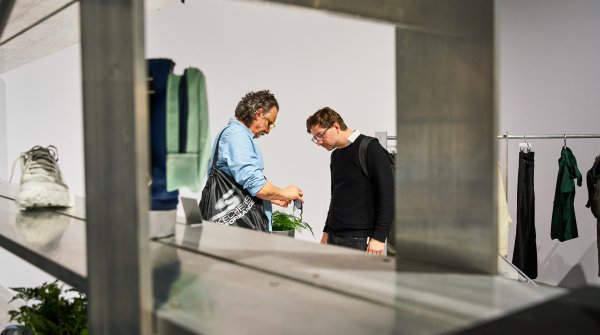
Pro Boycott: The Bought World Cup
The fact that corruption is practically always involved in the awarding of major sporting events such as the World Cup or the Olympics - who would know this better than football fans in Germany? Why the 2006 World Cup was a "guest of friends" and what role "Emperor" Franz Beckenbauer played in it has not been completely clarified to this day. Beckenbauer refers to "gaps in memory". But in the joint awarding of the 2018 World Cup to Russia and the 2022 World Cup to Qatar, new records were quite obviously set in terms of greasing and bribing. "Does anyone still remember December 2, 2010?" write authors Bernd-M. Beyer and Dietrich Schulze-Marmeling in their book "Boycott Qatar 2022! Why we must stop FIFA" (Verlag Die Werkstatt, 160 pages, 12.90 euros) about the decisive vote of the Executive Committee of the Football World Association FIFA. And further: "It would be an exaggeration to say that this was the Nine-Eleven of international football, but it was a huge shock and a turning point."
Because on that day, Joseph S. "Sepp" Blatter, then president of FIFA, held up a piece of paper that read "Qatar". With that, the 2022 World Cup was awarded to Qatar, an authoritarian, monarchist state with no football tradition or culture to speak of, where political parties are banned, Sharia law is the main source of legislation, and homosexuality is punishable by up to five years in prison. Fourteen of the 22 members of the executive committee, which included the later "slavery denier" Franz Beckenbauer (but not a single woman), nevertheless voted for Qatar. Only eight voted for their rival, the USA. Actually, the committee even had 24 members - but two were no longer allowed to vote because they had already been exposed as bribable.
"De facto, it was a criminal organization that awarded the tournaments to Russia and Qatar. For that reason alone, both countries should have been stripped of the World Cup and a new decision made," Beyer and Schulze-Marmeling write in their book. Only six months after FIFA's decision, ten members of the committee were already suspected of having sold their votes. The influence of politics was obviously also enormous. Because Qatar is well connected worldwide and meanwhile also in Germany, from VW to Deutsche Bank, one of the biggest foreign investors. Among others, the then German President Christian Wulff, the later Foreign Minister Sigmar Gabriel as well as the French President Nicolas Sarkozy are said to have strongly supported the hosting of the 2022 World Cup in Qatar. Can a tournament be awarded under these dubious circumstances? And can this Qatar corruption world cup be allowed to stand after all the sordid revelations? Or should the critics from summer fairytale Germany be very quiet here?
Contra Boycott: Change Through Dialogue
FC Bayern München has maintained excellent - and often heavily criticised - contacts with Qatar for years. The German champions regularly fly to the winter training camp in the capital Doha. And the sleeves of the FCB jerseys feature the logo of Qatar Airways, the state-owned airline and one of the club's most important sponsors. During his tenure, long-time Bayern chairman Karl-Heinz Rummenigge repeatedly defended the partnership with the Gulf state: "At FC Bayern, we believe that you achieve much more in a dialogue than in a permanently critical stance." When criticising presenter Jochen Breyer in the ZDF sports studio in February 2021, Rummenigge pointed to the "different culture and different religion" in Qatar. To which Breyer responded, to great applause on social media: "Human rights violations are not a culture."
The former Munich CEO is nevertheless convinced of the principle of "change through dialogue". He believes that the partners in Qatar "know our convictions, for example on the issue of workers' rights. But they will only listen to us on the basis of respect and trust." He is not alone in this position. Even the human rights organization Amnesty International opposes a boycott of Qatar stadium slaves 2022. "We want to take advantage of the international attention at the World Cup. It is now important that the reforms lead to long-term improvements beyond the World Cup," said Amnesty expert Lisa Salza.
World champion and ex-national player Toni Kroos added to T-Online: "The fact is that the Qatar slaves world cup will take place. The question is how to deal with it. I think we should try to give the tournament the biggest possible stage to draw attention to the grievances in the country. But please not only before and during the tournament, but also afterwards." His demand: "The media interest in Qatar must not fall away when the footballers leave again. That is important." It is indeed doubtful that the people and their fundamental rights would fare better in an isolated, internationally outlawed and boycotted Qatar.
Pro Boycott: Playing in the "kicktatorship"
The human rights situation in the future World Cup host country must still be described as devastating by Western standards. In the ranking of press freedom of the organization "Reporters without Borders" for the year 2021, Qatar ranks 128th out of 180 countries. Bernd-M. Beyer and Dietrich Schulze-Marmeling write in their "Boycott Qatar!" book: "Severely restricted in the country are freedom of speech and religion, the right to free sexual orientation, equal rights for women or even the right of workers to organize. Qatar's approach to the prosecution of undesirable individuals is opaque and brutal." Torture and other forms of ill-treatment occur in the process, according to Amnesty International.
In the democracy index of the British newspaper "The Economist", Qatar ranks 126th out of 167 countries and is classified as an "authoritarian system". After all, there are even more anti-democratic countries where FIFA could host its tournament in the future, the "front-runner" being North Korea. But major sporting events in unjust states have not only been a tradition since the 1936 Olympic Games in Nazi Germany. Two years earlier, Italy's fascist dictator Benito Mussolini used the 1934 World Cup in his own country as a political platform. And also in 1978 FIFA unhesitatingly awarded the World Cup to the military dictatorship of Argentina. The screams and cries for help from the torture cellars of the prisons were said to have been heard from the stadiums. Berti Vogts, as captain of the German team at the time, put the injustice into perspective: "Argentina is a country where order reigns. I didn't see a single political prisoner."

In 2013, Vogts' former team-mate Franz Beckenbauer "didn't see a single slave" during his friendly visit to order-loving Qatar. So 44 years after the Argentine military, Qatar's absolutist rulers will also be able to bask in the light of the 2022 World Cup and distract attention from the injustice in their country. For democratically minded observers and football fans, this is hard to bear. Is FIFA learning nothing? It doesn't want to, says the "Boycott Qatar!" book, quite the opposite: "World sports leaders and autocrats are soul mates. Both sides love the gigantic, the monstrous and indulge in fantasies of omnipotence. Countries like Russia and Qatar don't get the nod despite democratic deficits - but because of them." FIFA and the IOC hate freedom of the press and critical enquiries at least as much as Vladimir Putin or Qatar's ruler Sheikh Tamim bin Hamad Al Thani.
Pro Boycott: World Cup Stadiums as Death Traps
Qatar is home to 2.7 million people - but only 300,000 of them are citizens of the country. The vast rest of the population are workers (or labour slaves), mostly migrants from Nepal, India or Bangladesh without significant civil rights and without access to adequate health care. The notorious kafala system, a kind of dependency relationship between employers and workers, was abolished in Qatar under pressure from the West. Since then, employers are no longer allowed, at least officially, to withhold workers' passports, effectively imprisoning them. But massive human rights violations apparently still occur in employment. As the FC Bayern fan club "No. 12" claims to have learned in its research, workers in Qatar can be deported to their home countries overnight if they fall ill with Corona - often without receiving their wages and losing their possessions.
Only since 2017, due to pressure from abroad, has there been a monthly minimum wage of 230 euros - and that in one of the richest countries in the world. According to the British "Guardian", at least 6,500 people have died during World Cup construction work in Qatar since 2010 - most of them due to the downright brutal working conditions in the desert heat. So for every 700 or so football players at the 2022 World Cup, there are already almost ten dead construction workers. There will be blood on this World Cup trophy - although the concrete figures are considered controversial. That's because it's unclear how many of the deaths are actually the result of construction work. Either way, it remains absurd to build eight World Cup stadiums out of the desert in a mini-state like Qatar at a cost of up to four billion dollars. After all, the emirate measures just 11,627 square kilometres. With Saarland, Berlin, Hamburg and Bremen, only four of Germany's 16 federal states are even smaller.
In other words: In Schleswig-Holstein (15,799 square kilometres), between Lübeck, St. Peter-Ording and Flensburg, FIFA would have had more space for its football temples.
Contra Boycott: Progress in Qatar
The progress in Qatar, which Karl-Heinz Rummenigge also attributes to FC Bayern's local involvement, is apparently real. Rummenigge finds that Qatar has "already made quite a bit of progress in terms of human and labour rights". Human rights lawyer Sylvia Schenk agrees in March 2021 to the Spiegel "In a call by the Center for Sport and Human Rights with human rights experts* and FIFA, the representative of the international unions stated that the reforms in Qatar are real, there is great progress. Of course, everyone wants it to go even faster. But it was also said that no other country in history is known to have attempted so many reforms in such a short time."
Freelance football journalist Ronny Blaschke writes in the "Boycott Qatar!" book, which certainly lets all sides have their say: "By the standards of Europe, whose unions have evolved over generations, Qatar is backward. By the standards of the Gulf region, which has no labor movements, Qatar is a model for the future." And, Blaschke adds, "Cynical as it may sound, it's only through football that Europe has become aware of the many dead guest workers in Qatar." Schenk, like other observers, also doubts the figure of 6,500 dead World Cup construction workers. In fact, she says, "only" 20 percent of the victims worked on the stadiums. The lawyer warns that a World Cup boycott would stifle the apparently recognizable progress in Qatar: "A boycott would be completely wrong. It would only strengthen the forces of perseverance in Qatar instead of supporting the forces of reform."
Contra Boycott: Then the Whole Football Would Have to be Boycotted
Anyone calling for a boycott of the World Cup would have to boycott the entire football industry," says journalist Ronny Blaschke. After all, corruption, dubious dealings and insane handling of money are omnipresent in the modern football industry - no one needs to point the finger at Qatar for that. Moreover, the links between Qatar and other autocratic Gulf states and the international economy and global sport have long been so vast and irreversible that a World Cup boycott would seem downright absurd. Would Paris Saint-Germain then have to pay off its Qatari club owners? Would FC Bayern no longer be allowed to travel to the training camp in Doha? What about Deutsche Bahn? Would it still be allowed to participate in the multi-billion euro expansion of the Qatari railway network?
And how does one then deal with the even much larger, more powerful, and more influential Saudi Arabia, which is just now striving to enter world sports, and which, among other things, will hold its first Formula One race in December 2021 - although it is even behind Qatar in the rankings for democracy (156th place) and freedom of the press (170th place)? In view of the billions and billions that the Gulf states are investing in the West, it seems reasonable to say that there can no longer be any against each other - but only with each other, consistently and persistently trying to improve the living conditions of the local people. Journalist Blaschke expresses this pragmatically: "A broad World Cup boycott is unrealistic. We should say goodbye to the utopia that the commercial logic of professional football can be overcome. Those who nevertheless don't want to give up this hobby can achieve something good even in a bad system."
Boycott? There Nay be a Smarter Way
So, as things stand, the 32 teams will indeed travel to Qatar in November 2022 to determine their world champion - although the question is how much the World Cup title will still be worth in sporting terms at this tournament, which is absurd in many respects. Despite their book title "Boycott Qatar 2022!", Bernd-M. Beyer and Dietrich Schulze-Marmeling have long since stopped assuming that the footballers will stay at home, or that the viewers at home won't switch on the TV. Under the hashtag #BoycottQatar2022, they hope for clever and creative measures with which fans all over the world can show that they do not agree with FIFA's corrupt system and with the World Cup being held in the unjust state of Qatar.
The authors think of "civil disobedience", for example with counter-tournaments during the World Cup at home, protest actions, choreos in the stadiums, protest letters to those in charge and clear signs on social media. One of the most amusing ideas is the mascot "Infandino" as a symbol of a corrupt, backward-looking football official - in reference to FIFA President Gianni Infantino. The bottom line is that it is not FIFA that holds the levers of power - but the fans as the worldwide basis of football. The hopeful conclusion of the two experts: "Fans have power as consumers. If Coca-Cola and Co. realise that sponsoring such tournaments is poison for their coffers, they will stop doing so in future. And then, at the latest, FIFA will inevitably have to rethink."
- ISPO awards
- Mountain sports
- Bike
- Design
- Retail
- Fitness
- Health
- ISPO Job Market
- ISPO Munich
- ISPO Shanghai
- Running
- Brands
- Sustainability
- Olympia
- OutDoor
- Promotion
- Sports Business
- ISPO Textrends
- Triathlon
- Water sports
- Winter sports
- eSports
- SportsTech
- OutDoor by ISPO
- Heroes
- Transformation
- Sport Fashion
- Urban Culture
- Challenges of a CEO
- Trade fairs
- Sports
- Find the Balance
- Product reviews
- Newsletter Exclusive Area
- Magazine








